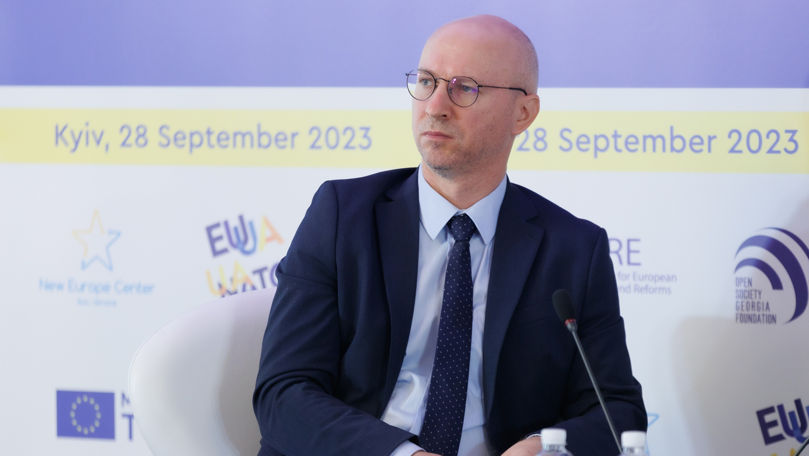
Secretary of Moldova's Supreme Security Council says modern warfare no longer begins with tanks at border, but with soldiers in jeans, propaganda
‘’Modern warfare no longer begins with tanks at the border, but with soldiers in jeans and online propaganda’’ warns Stanislav Secrieru, Secretary of the Supreme Security Council. He emphasizes that, in the face of new hybrid threats, Moldova needed vigilant institutions, strong international partnerships and a firm orientation towards the European Union - the only guarantee of peace, security and freedom.
Russia does not need soldiers in uniform to carry out destabilization operations, warns Stanislav Secrieru, Secretary of the Supreme Security Council and security and defense adviser to the Moldovan president.
In a Facebook post, the presidential adviser highlighted the real threats of hybrid warfare practiced by Russia, especially in the context of speculation about possible reinforcement of the Russian military presence on the left bank of the Dniester.
According to Secrieru, Russia's infiltration tactics are well-documented and historically tested and the absence of military uniforms does not mean the absence of a threat.
‘’Russia already has an entire hybrid warfare manual,’’ he said. Secrieru noted that, after 2014, when Ukraine blocked the rotation of Russian troops through its territory, Moldova had countered similar rotation attempts through the Chisinau International Airport, where Russian soldiers tried to pass as civilians.
Secrieru also presented several historical examples of Soviet troops' covert deployments, later continued by Russia:
In 1962, in Cuba, Soviet soldiers did not wear uniforms, being presented as 'agricultural experts';
In 1970, Soviet troops were transported to Egypt on tourist ships, dressed in civilian clothing;
In 1982, in Syria, the military was landed in a similar manner;
During the Angolan civil war (1975), Soviet troops operated on the ground in civilian clothes to hide their presence.
‘’This is an important lesson for all those who underestimate the danger,’’ concluded Stanislav Secrieru. He emphasized that Moldova must remain vigilant and strengthen its defense capabilities in the face of a war that no longer starts with tanks, but with subtle and well-coordinated tactics.
The deployment of tens of thousands of Russian soldiers to the Transnistrian region poses a real danger, if the Moldovan power is controlled by Russia. ‘’The risks are high for the country,’’ President Maia Sandu has recently to the national media.
Prime Minister Dorin Recean last week told the Financial Times that the Russian Federation intended to deploy 10,000 soldiers to the Transnistrian region. The Kremlin regime seeks to strengthen its military presence in the region, but currently cannot send additional troops because of the positioning of the Transnistrian region between Ukraine and Moldova, led by pro-European forces, the PM said.
Greek Prime Minister begins visit to Moldova
Trilateral meeting in Odesa // President of Romania: "We must remain steadfast in defending international law, respect for human life, freedom and democracy"
Odesa trilateral meeting // Ukrainian president's message for Moldovans: "If Europe loses Moldova, Russia will be encouraged to take your resources, sovereignty and history''
PHOTO // Trilateral meeting of Presidents of Moldova, Romania, Ukraine held in in Odessa
Moldovan MPs to convene at plenary meeting on 12 June
Moldovan cabinet's spokesman says government modernizes Chisinau through concrete projects
Moldovan government's spokesman speaks on challenges orchestrated in Transnistrian region
Prime Minister to participate in Wachau Europe Forum 2025 in Austria
Prime Minister of Greece to visit Chișinău
Moldovan police open criminal file desecration of graves at Chisinau-based Jewish Cemetery
Moldovan PM at Europa Wachau Forum: "We Contribute with Hard Work and Deep Trust in the Power of a Solidary Europe"
Investment worth over 290 million lei in Balti: abandoned hall to be transformed into modern food production factory
Moldovan parliament speaker condemns vandalism of gravestones at Jewish Cemetery
Moldova's president invites Moldovans from Germany to meetings
Former head of Moldova's Anti-Corruption Prosecutor's Office fails to pass vetting
Former head of Moldova's Anticorruption Prosecutor's Office fails to pass external evaluation
Moldovan PM participates in Europe Forum Wachau 2025
Moldovan president awards Order of Honor to three ambassadors of European countries ending mandates in Moldova
Moldovan magistrate to stand trial for influence peddling
Enhanced access to water, sewage; projects in Cahul, Rascani, Soroca declared of national interest
Secretary of Moldova's Supreme Security Council says modern warfare no longer begins with tanks at border, but with soldiers in jeans, propaganda
Moldovans invited to donate blood in national campaign
Moldova opens door to digital nomads
Approved in Parliament: Owners of historical monuments can get money from National Culture Fund
Moldova to establish territorial registers for intangible cultural heritage


